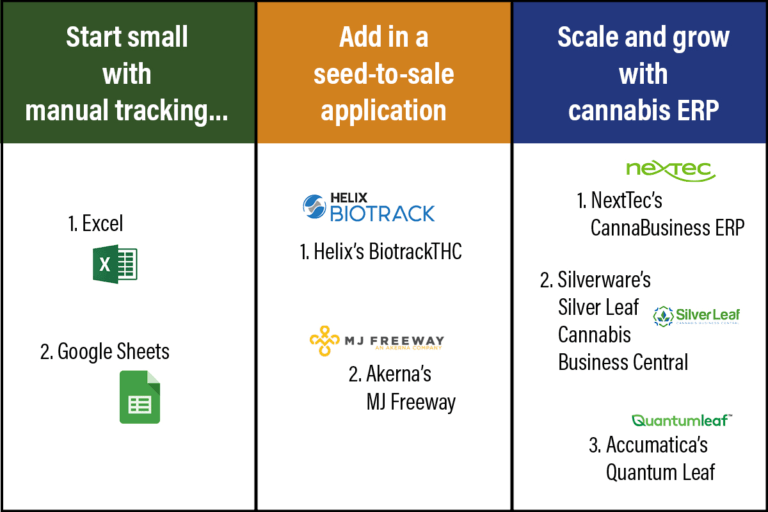Many states with legalized medical or recreational cannabis require license holders to report product movement using a chosen reporting system. The most common include Metrc, BioTrackTHC and Leaf Data Systems.
Regardless of whether a state has a mandated reporting system, licensed operators are obligated to maintain detailed records of product tracking should the state initiate an audit.
Because of this, cannabis operators look to technology for help.
While companies do not have a choice in the reporting system a state requires, they do have a choice in the software system used internally to track, manage and account for cannabis products.
An internal tracking software system must be capable of not only helping operators achieve compliance, but also operate a healthy, profitable and scalable business.
How should cannabis companies go about choosing a tracking system?
There are at least three approaches to the challenge.
Ultimately your choice will depend on factors such as an organization’s size, budget and its plans for growth and expansion.
Start small with manual tracking
Many, if not most, cannabis startups begin operation with big visions and small budgets.
So, like small-business startups in any industry, cannabis startups often begin life with an entry-level accounting package such as QuickBooks and a series of spreadsheets to manage the data that doesn’t have a home in that package.
Operating this way requires companies to collate and hand-key the required data into their state’s reporting system.
While a manual tracking system such as this can help a company meet compliance mandates, it involves a tremendous amount of duplicate data entry to maintain and does not provide insight into valuable business data such as profitability by product, materials-requirement planning, customer profitability or inventory turns.

Add in a seed-to-sale application
Another approach to managing compliance is to use a software system that is often referred to as seed-to-sale.
Seed-to-sale systems are narrowly designed with one goal in mind: to aid cannabis companies in achieving compliance in product tracking.
These applications typically do not offer broader accounting functionality so here, too, companies tack on an application such as QuickBooks.
One benefit of seed-to-sale applications is that most include a level of integration with a state’s reporting software that helps minimize the burden of duplicate data entry.
While seed-to-sale systems simplify compliance, their narrow focus can hamper the ability to adapt to the changing cannabis landscape, forcing companies to track parts of the business in separate systems, or even outside the software, which limits an organization’s ability to be innovative, efficient and nimble.
Moreover, with business data broken up in separate systems, the ability to gain deep insight into the overall operation is compromised.
Scale and grow with cannabis ERP
As companies grow and plan for expansion, acquisition or venture funding, they must critically evaluate their operations, looking for efficiencies in how they manage data.
While smaller companies can get by using multiple applications to hold data for various functional areas, larger and growth-minded companies will often turn to enterprise level systems, or ERP (enterprise resource planning).
While cannabis businesses are unique, in many ways they are no different than other regulated manufacturers that must track and trace their raw materials, lots and finished goods throughout the supply chain, making ERP applications a good fit.
However, “generic” ERP applications lack the cannabis-industry specific capabilities necessary to streamline a compliant and scalable operation.
In response, a new category of enterprise resource planning is emerging: cannabis ERP.
Cannabis ERP brings together all business data, including accounting functionality, products, lots, customers, vendors, raw materials and supplies in one application.
A single source of information enables cannabis operators to adhere to the rules, regulations, and statutes of your state, while also running a successful and compliant business (not simply a compliant one).
In addition, cannabis ERP applications are designed to integrate with state reporting applications.
With cannabis ERP, companies are able to automate manual tasks – freeing resources to focus on building their brand and maintaining quality standards.
Businesses gain access to decision-making data that helps to optimize inventory holdings and understand what and who is making the company money.
By delivering broad functionality, deep insight and traceable workflows, cannabis ERP applications provide a strong foundation that appeals to investors as well – if that’s part of a company’s game plan.
Scaling beyond compliance
Regardless of the state in which a company does business, compliance with product tracking rules is simply a baseline for legal operation.
Cannabis businesses must go beyond simple compliance, functioning both efficiently and effectively, or they will soon get left behind.
The choice of tracking technology will ultimately depend on a company’s goals and budget.
While there are multiple approaches to achieving compliance, a more comprehensive approach will ultimately yield the most flexibility and scalability, providing the agility so vital in this volatile industry.
Alex Glueckler is director of sales and strategy at Phoenix-based Silverware, where he is largely focused on their cannabis offering, Silver Leaf CBC. He can be reached at alex@silverw.com.
